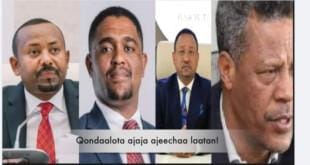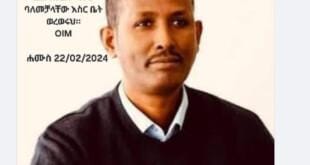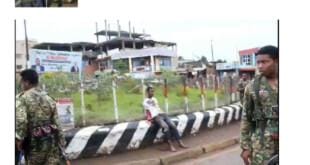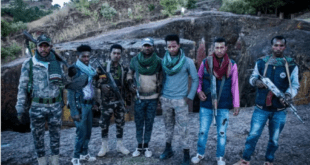Re-invent Yourselves!
By: Diida Borbor
March 17, 2016
As you know and feel, in Oromia, the glaring disparity, in terms of economic, social and
political entitlements, between Oromo on one hand and colonial settlers, economic
migrants and environmental refugee drifters on the other hand, is getting increasingly
difficult to stomach to the younger Oromo generation. While the children of settlers
advance within the bureaucracy, business and political domain, Oromo graduates are
deprived of such opportunities. Sadly, Oromo, in their own God given land, are
becoming outcastes and are more and more relegated to the status of 4th or 5th class
citizens.
Inevitably, there is a limit for everything and Oromo had enough and the history is
unfolding in front of our eyes – the gallantry of Oromo youth on hand and the savagery
of the TPLF on the other hand.
So, ever since the now 130 days old Oromo resistance irrupted and the barbaric and
racist tyrannical regime unleashed indescribable brutality against our people, Oromo
hoped that the Oromo diaspora political organizations would rescue them from the
savagery visited upon them. As the salvation never materialized, some of us are now
asking ourselves a burning question as to what the diaspora political organizations must
do to be relevant. In this context, the current Oromo national uprising started by
students and more and more joined by the masses has proved two points:
• First, the barbarity, brutality and savagery of the medieval proportion carried out
by TPLF kleptocratic thugs against unarmed Oromo protestors have been made
abundantly clear for the world to see – “the emperor has no cloth”. As a matter of
fact, from the inception we have known that the TPLF rebels turned out that they
were not freedom lovers at all; they were extremist thugs and violent criminals
with entrenched clientelism. As a result of such cronyism and racist nature of the
TPLF, there is not even a faint of glimmer of peaceful resolution in Ethiopia in the
distant future.
• Second, despite trumped up narratives of certain organizations, the Oromo
armed resistance is missing in action. Correspondingly, in terms of armed
struggle, the current ongoing uprising has showed that the “emperor has no
cloth”. As a result, our people are as defenceless as a lamb before the wolf.
Hence, no amount of damage control can hide this fact and trying to explain the
obvious by saying “… tooftaa ofi qabaa”, fools no one.
Some of us used to believe that qabsoo can be directed via remote control. However,
the 2015 Oromo uprising has proved that was a farce. Why? Because, qabsoo belongs
to the masses and the masses have taken the matter in their own hands. And, everyone
asks: where are the so-called qabasaawaa? Why do they bark and never bite? For
those who have eyes to see, the masses have shown that “emperor has no cloth”. So,
what are the choices left for diaspora political organizations? How can they find their
mojo and come up with leadership and organizational enablers to be relevant, once
again, in the Oromo national struggle? Although, given their account over the years I’m
somewhat misanthropic, I would like to give them a chance and accordingly take the
liberty of proposing the following 12 pointers for their considerations:
• First: carryout organization audit – about the health of your organizations – in
terms of leadership, organizational capacities and capabilities – be honest with
your members and the Oromo general public. Brutal honesty is demanded.
This is very important because the truth will set you free and help you understand
your current situation and prepare you for a vetting process to arrive at realistic
ways to contribute to the advancement of the Oromo national struggle.
One must know by now that Oromo are not going to be duped or taken in by
press releases, trumped up narratives and waving banners at someone’s events
and then posting it on YouTube with the intention of bamboozling the
unsuspecting viewers that they were the organizers of the event(s). This qurcii
syndrome has to end. As you know qurciis get married at someone’s wedding.
• Second: accept the fact that you’re diaspora organizations. So, accepting this
reality can afford you abundant opportunity to do what is possible and practical –
playing a positive supportive role of your Oromo compatriots back home. It’s
never too late.
• Third, admit the fact that real qabsoo is in Oromia, not in diaspora. This is
also very important and realizing this basic fact will help you reorient your frame
of mind and prepare you to play a positive supporting role of your compatriots
back home, instead of playacting and fantasizing about qabsoo in all the wrong
places.
• Fourth: concede the fact that the masses are the one leading the now 130
days old Oromo national resistance. “Nutti duuban jira” and “Nutti jaare” is not
going to fool anyone. Not a day passes before some uninformed trying to
convince us that actually that is the case.
• Fifth: acknowledge the fact that one cannot play leadership role via “remote
control” and absentee leadership has no place in national liberation struggle.
For a national liberation struggle to succeed, the leadership must take roots –
embedded – in the country, and moreover it cannot be directed via remote
control.
• Six: don’t try to highjack qeerro’s leadership by trying to infiltrate or by
creating a parallel group to hoodwink Oromo in general and Qeerro in particular.
The introduction of certain banner at recent protests in Oromia and the so called
Qeerro support group in diaspora are some of the sinister moves on the part
those who try to highjack the movement. As things stand today, the diaspora
political organizations don’t have a good track record and even if they succeed in
high-jacking the movement, all they can do is bring it down to their own level –
impotent, exhausted, stunted, disorganized, conflicted, superficial, unreceptive
and inept. So, do the right thing.
• Seven: associate with the right people – if the old guards want to be relevant
once again in the Oromo national struggle, it must stop appealing to the worst in
us and instead make genuine efforts to appeal to the best in us. For the past 25
years, the diaspora political organizations have been doing the same thing over
and over and over again and yet expecting different result. The result speaks for
itself. The main reason for this is that they chose to surround themselves with
uninformed, incompetent, inexperienced, no-do-gooders and all mouth and no
brain masquerading as Oromo representatives-cum-qabsaawaas and causing
havoc within community organizations. If this is not a lack of saafuu, tell me what
is?
The old saying, “tell me who your friends are and I will tell you who you are” also
holds true for leadership. Leaders are judged by their followers. Both must have
leadership skills, abilities, commitment, emotional intelligence, competencies and
experience needed to meet organizational challenges. Specifically, they must
have:
o Good character, reputable, honest and trustworthy.
o Ability to build and maintain relationships – adequate people skills.
o Knowledge and experience.
Therefore, those who speak in the name of Oromo must be reputable, respected
and qualified individuals. There is no room for drunkards, drug pushers, habitual
liars, social misfits and disreputable individuals. Such personalities only bring
shame and disgrace to the organization and to Oromo. Oromo deserve better.
• Eight: stop cannibalizing each other – it is time to move on – past petty division
and past gridlock – as the cost of not doing is steep. Even if you don’t want to
cooperate with each other, then avoid sabotaging and cannibalizing one another
and instead direct your energy solely on defeating the enemy.
• Nine: stop the messiah syndrome that professes only your organization is the
only way to bilisummaa. There are so many complementary roles different
organizations can play.
• Ten: stop behaving like travel agents – the role of leadership is not like that of
travel agents – sending people to places they have never visited themselves. The
role of leadership is similar to that of tour guides – taking people to places that
they themselves have visited before – by leading and taking charge.
• Eleven: re-invent yourselves so that you can be relevant to the Oromo national
struggle once again. In this regard, you could engage in advocacy work similar to
but not limited to what OMN, OSA, Oromo communities, etc. are doing – playing
a supportive role of their Oromo compatriots back home. Such vicious circle is
not easy to break. It can be done and so need to look back on the wasted years.
However, our work is cut out for us.
• Twelve: pass on the torch, formally, to the new generation. The old guards,
(individually or collectively) after further reflecting and vetting, must be duty-
bound to:
o accept the fact that over the years they have done what they could;
o acknowledge that the time for generational change is long overdue; and
o agree to officially pass on the torch to the hashtag generation.
This way, the old guards can get out of the way and afford the new generation
the opportunity to organize itself the way it see it fit to further advance the Oromo
national struggle. After all, the future and Oromia belong to the new generation.
Thus, the hashtag generation must go to Baalee and re-launch the struggle
rather than waiting for the old leencha that fled via Boolee to go back and finish
the job for it.
Finally, the Diasporas must hold /bring these organizations to account whenever they
deceive their compatriots back home. No more deceits such as: “leenchii bosonaa …
dhufaa jira”, “nutti duuban jira”, etc. be tolerated and no more looking the other way.
Therefore, the Diasporas have a solemn responsibility to speak truth to the “powers” so
that our compatriots back home are not duped. It’s the right thing to do; and it’s in our
collective interest do so.
Oromia Shall be Free!




